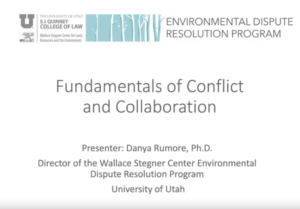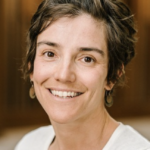 Every year, I train and coach hundreds of professionals and university students in the skills of collaboration and conflict resolution. In working with these diverse individuals and teams from across the country and internationally, I have come to realize that a few simple shifts in how we see, understand, and deal with conflict can totally change our relationships with each other and ourselves—as well as the outcomes of our interactions—in profoundly powerful and positive ways.
Every year, I train and coach hundreds of professionals and university students in the skills of collaboration and conflict resolution. In working with these diverse individuals and teams from across the country and internationally, I have come to realize that a few simple shifts in how we see, understand, and deal with conflict can totally change our relationships with each other and ourselves—as well as the outcomes of our interactions—in profoundly powerful and positive ways.
One of the most important shifts is simply to move from seeing conflict as a problem and something to be avoided to instead seeing it as a healthy, normal part of life. The reality is, as I put it, “conflict just is”—it is unavoidable. We will not always see eye to eye, and we will not always want or need the same things. When we accept this, it frees us up to see that conflict, if properly handled, can actually be quite productive. Accepting and embracing that “conflict just is” empowers us to take responsibility for making conflict productive and avoiding things that will likely lead to it becoming destructive (such as ignoring it or personalizing it).
Another critical shift is to move from seeing the world through a zero-sum, either-or, or “fixed pie” lens to instead realize that the world is a complex place in which many things can simultaneously exist, in which many needs can be met through elegant “yes, and” solutions, and in which we can create value for everyone involved by having productive conversations and harnessing the co-creative potential of conflict. Unfortunately, our tendency to see the world as a zero-sum game often leads to a win-lose mentality, and in our struggles to “win” we often create lose-lose outcomes and don’t really address the problems that brought us into interaction in the first place.
Get notified when new articles are posted to the EDR blog. Sign up for our email list »
A third powerful shift is to move from focusing on what we call “positions,” i.e., specific strategies or solutions for addressing a problem or challenge, to instead focusing on what we call “interests,” or fundamental needs or concerns. When we are able to understand our own interests and the interests of others, we open the door for productive collaboration. Watch for our next blog in August for more about interests vs. positions and how to make this shift.
These shifts and a few other key things we think people need to know about conflict and collaboration are explained in our simple Fundamentals of Conflict and Collaboration video, which is free and publicly available on our Environmental Dispute Resolution (EDR) program tools and resources webpage.
The EDR program team and I believe that helping society work through our pressing social, economic, and environmental challenges is going to require that we rapidly become much more skillful in dealing with conflict. Thus, we are on a mission to help people embrace conflict and gain the awareness and skills necessary to make conflict productive. We are doing so through teaching and training, individual and team coaching, collaboration assistance and advising, public education (such as our blogs and online tools and resources), and thought leadership. As part of our thought leadership efforts, I will be taking some time this next year to work on a book to guide us all in making conflict more productive in our personal, professional, and societal lives.
If you or anyone you work with wants to skill up to better harness the productive potential of conflict, or if you have ideas for how we can help foster a culture of making conflict productive (or if you have ideas for my book!), let us know. We would also love to hear your thoughts on our tools and resources webpage, such as whether those materials are helpful—or if others are needed. Contact our team at edrprogram@law.utah.edu.
Conflict just is. It is what we do with it that matters. Let’s make conflict productive and, in so doing, help our world flourish and better address the urgent challenges we face!
 Danya Rumore, Ph.D., is the director of the Environmental Dispute Resolution program in the Wallace Stegner Center at the University of Utah. She is a research professor in the S.J. Quinney College of Law and a clinical associate professor in the city and metropolitan planning department at the University of Utah. She teaches about, practices, and conducts research on conflict, negotiation, dispute resolution, leadership, and collaborative problem solving. She is also the founder and a co-director of the Gateway and Natural Amenity Region (GNAR) Initiative.
Danya Rumore, Ph.D., is the director of the Environmental Dispute Resolution program in the Wallace Stegner Center at the University of Utah. She is a research professor in the S.J. Quinney College of Law and a clinical associate professor in the city and metropolitan planning department at the University of Utah. She teaches about, practices, and conducts research on conflict, negotiation, dispute resolution, leadership, and collaborative problem solving. She is also the founder and a co-director of the Gateway and Natural Amenity Region (GNAR) Initiative.
